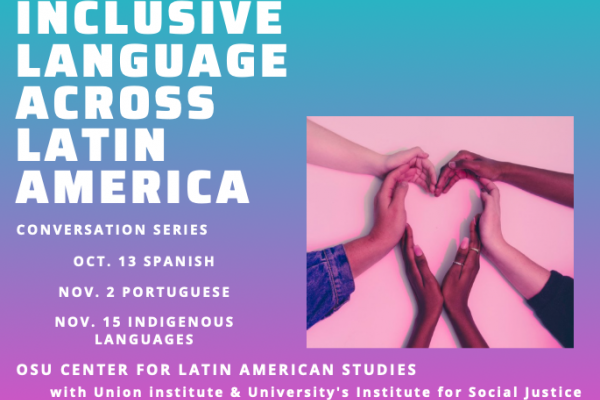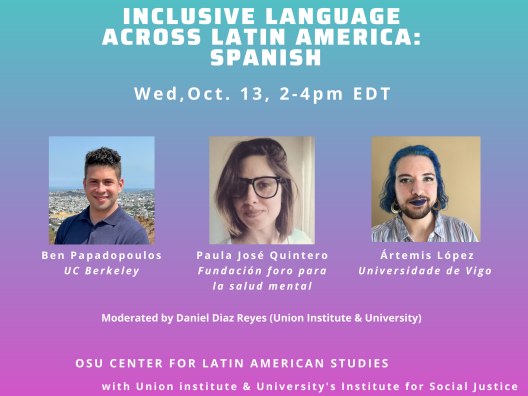
Join us via Zoom on Wed., Oct. 13, from 2-4pm (EDT) for a conversation about inclusive language in Spanish.

Meet the Panelists:
Ben Papadopoulos (he/they, él/elle) is a doctoral student and Graduate Student Instructor in the Department of Spanish & Portuguese at the University of California, Berkeley. He is also the founder of the Gender in Language Project (genderinlanguage.com). His research is based around the linguistics and theoretical linguistics of gender-inclusive language, with particular focus on the expression of nonbinary gender identities in masculine-feminine gendered languages.
Paula José Quintero, PhD, (ella, she) is a clinical psychologist with Fundación Foro para la Salud Mental in Buenos Aires. She is trained in, teaches about, and has published extensively on Dialectical Behavior Therapy (DBT), Acceptance and Commitment Therapy (ACT), and Behavioral Activation for Depression (BATD). She has also shared her work on inclusive language and its psychological effects, among many other topics, in public-facing fora such as Psyciencia.
Ártemis López (artemis@queerterpreter.com; they (EN), elle (ES)) is a PhD Candidate in Linguistics at the Universidade de Vigo in Galiza, Spain, where they research non-binary Spanish. They hold a M.A. in medical translation from the Universitat Jaume I, also in Spain, and have been translating and interpreting professionally for over a decade
Moderator:
Daniel Diaz Reyes, PhD, JD, (he) teaches in the Education Studies concentration of the Interdisciplinary Doctoral Program at Union Institute and University. He holds a professional background in Anthropology, Education, Ethnic Studies and Law. His definition of community is based with the Afro-Indigenous people of Costa Chica and Nahuatl speakers of southern Mexico and the diaspora. His current research concentrates on pedagogical praxis, politics of schooling, and curriculum design to support implementation of liberatory projects in education. His projects address education systems as sites of social reproduction to examine transnationalism, human movements, and youth culture with a focus on Black, Brown, Chicana, Latinx and Indigenous communities.
